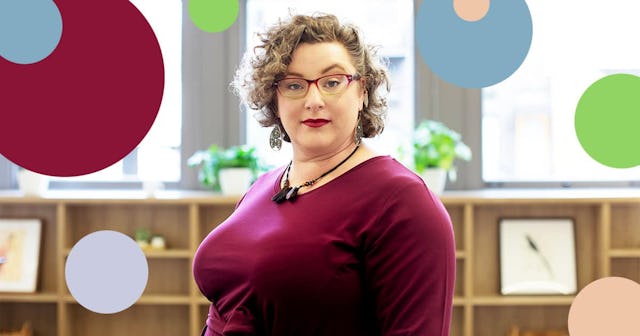Don't Panic If Your Kid Calls Me Fat

Kids say the darnedest things. Sometimes, they say the most embarrassing things. When those things are about someone else’s appearance, the embarrassment factor can increase by about a zillion. When my son was younger, he told a woman we know that she was “fat, but only medium fat, not really big fat like my mom.” Luckily, I didn’t actually fall down dead, but I almost wanted to. So humiliating.
Honestly, a tiny part of me was kind of proud. Not that he said it out loud — that part was mortifying. But it made me feel good that my kid had literally no idea that anyone thinks it’s bad to be fat. We have a very body positive household, and he has grown up with a fat mom. The woman he loves most on earth is fat, and he thinks I’m totally great. (Except when I make him do chores, but that’s not the point.)
To him, calling that woman fat was just a fact, almost like saying, “You’re tall, but only medium tall. Not really big tall like my dad.” To my kids, body size is neutral. It’s just another way to describe a person, like hair color or height.
Kids are going to notice when people look different or when they have one very prominent characteristic. It’s normal, and while we need to help them learn the rules of socialization, we don’t have to freak out if they do some mildly humiliating shit along the way. That’s just part of this bonkers parenting ride.
If your kid calls someone fat, you can totally salvage the moment. You’ve just got to be cool.
1. Don’t panic.
Okay, your kid called someone fat. That’s super embarrassing. We know as adults that commenting on the size of someone’s body is considered rude, so watching our kids do it makes us cringe. The good news is, as adults, we also know that kids are still learning. No reasonable adult will flip out on a parent whose kid has commented on the way they look. A kid asked me why I was “a circle” once. It didn’t hurt my feelings. It made me chuckle. I am a circle, and that was a reasonable question.
If one day circle kid is your kid, just remain calm. The only time I’ve ever felt embarrassed by a child calling me fat is when their parent clammed up and over-apologized. You’ve got to take it in stride. It’s not that big of a deal.
2. Use a matter-of-fact tone to validate their observation in a positive way.
If a child calls me fat, my response is usually, “Yup! I’m fat! Isn’t it amazing that people can come in so many shapes and sizes?” It’s matter-of-fact, and it celebrates everyone’s body as important and acceptable. You can use this approach for any kind of difference. Make sure they know that different doesn’t mean worse — it just means not exactly like them.
3. Don’t shut them down.
AllGo/Unsplash
If a kid calls me fat, and a parent tells them not to say that, it sends the message that being fat is somehow shameful. Allowing your child to believe that sets them up for a lifetime of disordered eating patterns and body image struggles. Your child needs to know that you don’t connect their beauty or worth to the size of their body– which means they need to know you don’t do that to anyone else, either.
4. Don’t contradict them if they’re clearly correct.
Listen. Don’t tell your kid I’m not fat. It’s so embarrassing to stand there and listen to that mess when I am so clearly fat.
I know. They know. You know. The charade is a disaster.
If you contradict your kid to reassure me, you’re telling your child that they can’t trust their own observations. That’s confusing AF. Kids need to be allowed to trust their own two eyes, and adults need to toughen up enough to give kids room to explore their world and make some social missteps along the way.
5. Have a private conversation about it after the fact.
So, it’s not a huge deal if a kid makes a comment about someone’s body, but we do need to teach our kids how to exist within our society. Your kids need to learn that commenting on someone’s body size and appearance isn’t generally appropriate. They need to know that questions or comments about someone’s differences are usually best saved for a quiet moment with you—but they do need the freedom and safety to ask.
6. Don’t expect them to magically be better than you.
Here’s the hard truth, parents: If you’re constantly pointing out your own perceived flaws, talking about other people’s bodies, making rude jokes about people with mobility differences, spouting off racist BS, or just generally acting like a negative garbage person, your kid is going to do the same. If you don’t hold people-friendly, body-positive attitudes behind closed doors, your kids are doing to sell you the heck out. It’s not their job to cover up the rude shit you say in private, so be careful how you think and what you say.
If we start approaching body differences with matter-of-fact answers, we might have a shot at making the world better for the next generation. While they’re trying to figure it out, you might suffer through an embarrassing moment or two. It’s not the best part of parenting, but it doesn’t have to be a big deal. Hang in there. Your kids are doing the best they can, and so are you.
This article was originally published on